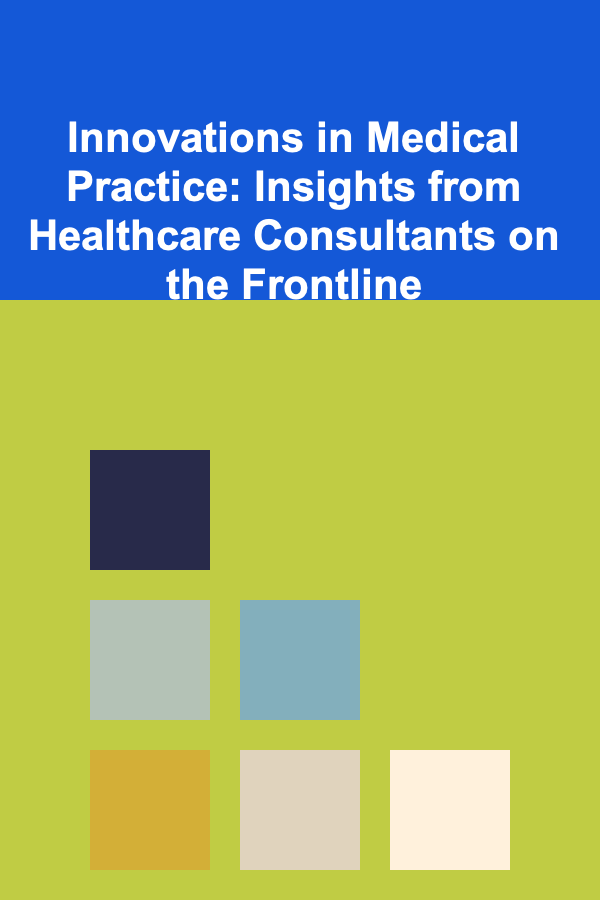
Innovations in Medical Practice: Insights from Healthcare Consultants on the Frontline
ebook include PDF & Audio bundle (Micro Guide)
$12.99$10.99
Limited Time Offer! Order within the next:

The healthcare industry is undergoing a seismic shift, driven by advancements in technology, evolving patient expectations, and the relentless pursuit of better outcomes. Healthcare consultants, as experts navigating this complex landscape, are uniquely positioned to offer valuable insights into how innovations in medical practice are reshaping the field. From the implementation of artificial intelligence to the growth of personalized medicine, healthcare consultants play a critical role in advising organizations on how to adopt, adapt, and integrate these innovations for improved patient care and operational efficiency.
In this article, we will explore some of the most impactful innovations in medical practice, grounded in insights from healthcare consultants who are working on the frontlines of the industry. These innovations promise to revolutionize how healthcare is delivered, with significant benefits for both patients and providers.
Artificial Intelligence and Machine Learning in Healthcare
Artificial Intelligence (AI) and Machine Learning (ML) have emerged as transformative technologies in healthcare, offering solutions that improve both clinical outcomes and operational efficiency. Healthcare consultants are leading the charge in helping organizations integrate these technologies into their practice.
a) Diagnostic Assistance and Early Detection
AI algorithms have demonstrated remarkable capabilities in analyzing medical images, identifying patterns, and making predictions that assist doctors in diagnosing conditions earlier and with more accuracy. For instance, AI-powered imaging tools have proven effective in detecting diseases like cancer, cardiovascular conditions, and neurological disorders at earlier stages than traditional methods.
Actionable Steps for Implementation:
- Adopt AI-driven imaging tools that can assist radiologists and pathologists in detecting abnormalities in X-rays, MRIs, and CT scans. Healthcare consultants can guide the selection of the best solutions based on the specific needs of the practice.
- Train staff on interpreting AI-generated recommendations and integrating these insights into clinical decision-making.
- Evaluate accuracy and efficacy regularly to ensure the AI tools are continually improving and providing value.
b) Predictive Analytics for Patient Risk Management
Predictive analytics, fueled by machine learning, can be used to predict which patients are at high risk of developing specific conditions, being readmitted, or suffering adverse events. By analyzing vast amounts of historical data, AI can flag potential risks, enabling healthcare providers to intervene earlier and more effectively.
Actionable Steps for Implementation:
- Implement predictive analytics platforms that integrate with Electronic Health Records (EHR) to flag high-risk patients for specific conditions, such as heart disease or diabetes.
- Use machine learning algorithms to analyze patient demographics, history, and test results to predict future health outcomes.
- Ensure real-time updates and actionable alerts for healthcare providers to take preventive actions, reducing hospital readmission rates and improving overall care.
Personalized Medicine: Tailoring Treatments to the Individual
Personalized medicine is a growing trend that focuses on tailoring medical treatment to the individual characteristics of each patient, including their genetics, lifestyle, and environment. Healthcare consultants are integral in helping organizations implement personalized treatment plans, which are proving to be far more effective than traditional "one-size-fits-all" approaches.
a) Genomics and Precision Medicine
With the advancements in genomics and genetic testing, healthcare providers can now identify genetic markers that predict how a patient will respond to certain treatments. This has profound implications for cancer treatment, where therapies can be chosen based on the genetic mutations present in a patient's tumor.
Actionable Steps for Implementation:
- Integrate genetic testing into standard care for patients with complex conditions, especially cancer, to enable precision treatment options.
- Work with genetic counselors to ensure patients fully understand the implications of their genetic information and treatment options.
- Update clinical protocols based on the latest findings in genomics to ensure that healthcare teams are utilizing the most relevant and effective therapies.
b) Tailored Drug Therapies
Pharmacogenomics, a branch of personalized medicine, focuses on how drugs interact with an individual's genetic makeup. By understanding how a patient's genetic profile affects drug metabolism, doctors can select the most effective medications and avoid those that may cause adverse reactions.
Actionable Steps for Implementation:
- Adopt pharmacogenetic testing as part of routine care, particularly for patients with chronic conditions who require long-term medication.
- Train healthcare providers to interpret pharmacogenomic results and incorporate them into treatment decisions.
- Encourage collaboration between healthcare teams, genetic counselors, and pharmacists to ensure that drug therapies are personalized for each patient.
Telemedicine and Remote Care: Extending Access and Improving Convenience
The global COVID-19 pandemic accelerated the adoption of telemedicine, allowing healthcare providers to maintain continuity of care while minimizing the risk of exposure to the virus. However, the benefits of telemedicine extend beyond the pandemic and are poised to redefine the future of patient care.
a) Virtual Consultations and Remote Monitoring
Telemedicine allows patients to consult with healthcare providers from the comfort of their homes, reducing the need for in-person visits and improving access to care, especially for those in rural or underserved areas. Remote patient monitoring (RPM) devices also enable healthcare providers to track patients' vital signs, chronic conditions, and recovery from home.
Actionable Steps for Implementation:
- Adopt telehealth platforms that offer secure video consultations, integrating them into existing workflows.
- Implement remote monitoring tools for chronic disease management, allowing healthcare teams to track patient data in real-time and intervene when necessary.
- Ensure compliance with regulations, such as HIPAA in the U.S., when implementing telehealth services to protect patient privacy.
b) Expanding Access to Specialists
Telemedicine also facilitates access to specialists, which can be particularly beneficial for patients in rural or remote areas who would otherwise have difficulty accessing specialized care. Virtual consultations with specialists can be integrated into primary care workflows, enabling comprehensive care with minimal travel.
Actionable Steps for Implementation:
- Partner with specialists to provide teleconsultations as part of the primary care offering.
- Develop cross-disciplinary care teams that include specialists from different fields who can provide remote consultations to primary care physicians.
- Integrate telehealth into referral systems, making it easier for patients to be connected with the appropriate specialist remotely.
Robotics and Automation: Enhancing Surgical Precision and Efficiency
The introduction of robotic-assisted surgery has transformed surgical procedures by allowing for more precision, less invasive techniques, and faster recovery times. Consultants in healthcare are essential for advising organizations on how to incorporate robotics and automation into their surgical teams.
a) Robotic Surgery
Robotic systems, such as the da Vinci Surgical System, allow surgeons to perform minimally invasive procedures with greater accuracy. These systems enhance the surgeon's dexterity and provide high-definition 3D visualization, which can reduce complications and shorten recovery times for patients.
Actionable Steps for Implementation:
- Invest in robotic surgery systems and provide necessary training to surgical teams to ensure optimal utilization.
- Integrate robotic surgery into routine practice for procedures that benefit from minimal invasiveness, such as prostatectomies, hysterectomies, and cardiac surgeries.
- Monitor patient outcomes post-surgery to assess the benefits of robotic assistance, such as reduced recovery times and lower complication rates.
b) Automation in Non-Surgical Procedures
Automation also plays a key role in non-surgical aspects of healthcare, from administrative tasks to patient data management. AI-driven tools are being used to automate tasks such as appointment scheduling, billing, and patient record management, which allows healthcare providers to focus more on patient care.
Actionable Steps for Implementation:
- Automate administrative workflows using AI tools that can handle scheduling, billing, and patient intake.
- Implement AI-based chatbots for answering patient queries and providing appointment reminders, improving patient engagement and reducing staff workload.
- Utilize automation for documentation to reduce the time healthcare providers spend on administrative tasks, allowing them to focus on patient care.
Healthcare Data Interoperability: Improving Information Exchange
A significant barrier to improving healthcare outcomes has been the lack of interoperability between different healthcare systems. However, the push for better integration of healthcare data is helping to bridge this gap, ensuring that patient information is shared seamlessly across various healthcare providers.
a) Electronic Health Records (EHR) Integration
Consultants are advising healthcare organizations on how to optimize the use of Electronic Health Records (EHR) to improve the exchange of patient information. By ensuring that EHR systems are integrated across providers, healthcare organizations can ensure continuity of care and reduce errors caused by incomplete or fragmented patient data.
Actionable Steps for Implementation:
- Standardize EHR platforms across healthcare networks to ensure that patient data can be accessed by authorized providers in real-time.
- Implement interoperability solutions to allow data exchange between disparate systems, such as laboratory information systems and pharmacy management systems.
- Train staff to use EHR systems effectively and ensure that patient data is updated regularly to reflect accurate and comprehensive medical histories.
Conclusion
The healthcare industry is undergoing a period of rapid transformation, fueled by innovations that range from artificial intelligence and robotics to personalized medicine and telehealth. Healthcare consultants, by working closely with organizations on the frontlines of care, play a critical role in helping them navigate this complex landscape. By adopting and integrating these innovations, healthcare organizations can improve patient outcomes, increase operational efficiency, and provide more personalized care. The future of healthcare is incredibly promising, and consultants will continue to be at the forefront, guiding the industry towards a more innovative, efficient, and patient-centered approach.

How to Choose the Right Flooring for Your Renovation
Read More
How to Get Started with Peer-to-Peer Lending for Alternative Investments
Read More
How to Keep Your Home Pest-Free with Preventative Measures
Read More
How to Master Your Speaking Voice for Public Speaking
Read MoreHow to Understand the Importance of Tracking Progress
Read More
How To Master Outdoor Sketching and Journaling
Read MoreOther Products

How to Choose the Right Flooring for Your Renovation
Read More
How to Get Started with Peer-to-Peer Lending for Alternative Investments
Read More
How to Keep Your Home Pest-Free with Preventative Measures
Read More
How to Master Your Speaking Voice for Public Speaking
Read MoreHow to Understand the Importance of Tracking Progress
Read More